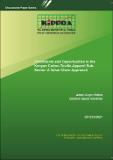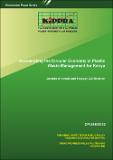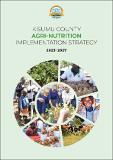Discussion Paper No. 335 of 2024 on Using Blockchain Technology in Advancing Information Flow in Kenya’s Avocado Value Chain
Publication Date
2024Author
Type
KIPPRA Publicationsviews
downloads
Metadata
Show full item recordBy
Milimo, Davis & Naududu, Elizabeth
Abstract/
Blockchain technology (BCT) can provide a channel for efficient information flow that is necessary. This study sought to advance information flow in the avocado value chain using BCT. Despite developments such as contract farming, integration of ICT systems, and extension services; the avocado value chain faces numerous challenges among them inadequate market information, weak vertical-horizontal linkages, and post-harvest losses. This has negative impacts on avocado production and export sales due to uneven distribution of profits among the producers. The study identified that for the implementation of BCT in the avocado value chain, various driving forces directly influence its use. The key drivers include little expertise and insufficient knowledge of using BCT either at a single point or multiple points of the value chain, and low scalability of BCT limits the number of users and volume of transactions. High initial costs associated with acquiring BCT, especially for smallholder farmers, can lead to a monopoly situation over time for those who can pay for it. There is a need for immutable records for the avocado value chain to help store information safely and permanently. The presence of intermediaries can lead to information asymmetry in local and international avocado markets. Limited policies and laws on BCT pose challenges to compliance concerning food safety, traceability, and transparency. Standardization for integrating BCT seamlessly with the current system is inadequate while issues of data privacy and cyberattacks among others require solutions. The impacts of these driving forces on each other can lead to effective use, early adoption, late adoption, or low use of BCT. To address the future scenarios of low use and late transition of BCT, the study recommends formulating comprehensive legal and regulatory frameworks to govern and support innovations while mitigating potential risks. This will improve compliance and guarantee fair compensation to smallholder farmers. Building capacities for strengthening the national ecosystem through technical skills development for professionals, education, and training for farmers will accelerate the adoption of BCT thus improving avocado yields. Increasing the engagement with global digital governance through supporting investments and partnerships in BCT use, will promote sustainability in the avocado value chain.
Subject/
Blockchain Technology; Information Flow; Value Chain; ICT Systems; Extension Services; Avocado Value Chain
Publisher
The Kenya Institute for Public Policy Research and Analysis (KIPPRA)Series
DP/335/2024;Collections
- Discussion Papers [346]
Related items
Showing items related by title, author, creator and subject.
-
Discussion Paper No. 253 of 2021 on Constraints and Opportunities in the Cotton-Textile-Apparel Subsector in Kenya: A Value Chain Approach
Shibia, Adan Guyo & Senelwa, Benson Igesa (The Kenya Institute for Public Policy Research and Analysis (KIPPRA), 2021)The cotton-textile-apparel value chain in Kenya is prioritized for job and wealth creation in the "Big Four" agenda given it is highly labour-intensive. The subsector has, however, performed below expectations, since it ... -
Discussion Paper No 288 of 2022 on Accelerating the Circular Economy in Plastic Waste Management for Kenya
Anomat, Jecinta & Ibrahim, Hassan Ali (The Kenya Institute for Public Policy Research and Analysis (KIPPRA), 2022)The transition to a circular economy has gained global momentum, and Kenya is starting to embrace this concept, led by the private sector and government policy frameworks. Plastic waste poses a significant environmental ... -
Kisumu City County Agri-Nutrition Strategy Paper 2023-2027
County Government of Kisumu (County Government of Kisumu, 2023)The Kisumu County Agri-Nutrition Implementation Strategy (CANIS) has been developed at a time when the world, Kenya, and Kisumu are experiencing challenges to adequate, safe, and nutritious food for their populations. ...




